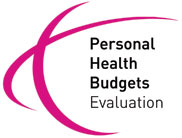|
Personal health budgets aim to give people greater control over the health services they use, as part of a policy commitment to a more personalised and responsive NHS.
This new way of delivering health care represents a major cultural shift within the health care service, which needs to be evaluated before any decision to extend its availability across the country is made.
In 2009, the Department of Health invited primary care trusts to put forward PHB projects to be part of a pilot implementation, supported by a rigorous evaluation, to explore the opportunities PHBs offer. This outline sets out the aims and plans for the evaluation.
The evaluation sets out to
- explore the process of implementing PHBs from the perspectives of patients and carers
- investigate the short- and longer-term impact of PHBs on different groups of patients and carers (for example, changes in health and social care related outcomes, and changes in satisfaction)
- explore the effect of implementation on how staff perceive and carry out their roles
- assess the cost-effectiveness of implementing PHBs for different health conditions compared to conventional service delivery
- assess the costs and benefits of different models of PHBs for different age, ethnicity and socioeconomic status groups (among others)
- explore the short- and longer-term impact of implementing PHBs on organisations and staff and the wider health and social care system (for example in demand for services)
- assess the wider impact of PHBs within the context of the NHS and its values (especially its underpinning equity principles)
- assess the behavioural changes of patients and staff resulting from the implementation of PHBs
- take a long-term view by using the information and insights gained from the pilot programme to explore what might happen were PHBs to become the norm
The pilot programme includes 70 sites, 20 of which will be selected to participate in the in-depth evaluation. The PCTs in the wider cohort will be asked to provide information on costs associated with implementing PHBs in their locality and information about the implementation process. To collect these data, a web-based questionnaire will be developed for project leads to complete. Data on the impact of personal health budgets on cost and outcomes among budget holders will also be explored in this wider cohort.
The 20 in-depth pilot PCTs within the main evaluation will be selected through the following criteria:
- PCTs offering personal health budgets to one or more of these groups of people
- patients receiving NHS continuing health care
- patients receiving NHS treatment for mental health problems
- people with long-term health conditions (diabetes, chronic obstructive pulmonary disease, stroke or long-term neurological conditions)
- PCTs offering PHBs to a large enough group of patients aged 18 years and over
- PCTs planning a mixture of deployment options (for example notional budget, real budget held by a third party, direct payment)
- PCTs enabling representation of a range of socio-economic groups, age groups, ethnicities and urban/rural populations
In addition, the evaluation will examine whether personal health budgets have an impact on two specialist services: maternity and end of life care. The evaluation has
ensured that PCTs intending to offer PHBs for these services are represented in the in-depth group.
A controlled trial (without randomisation) will be used in the evaluation. The design aims to recruit 1,000 patients in the PHB group and 1,000 patients in the comparison group over 12 months starting in 2010. The research design will use both quantitative and qualitative approaches.
The evaluation commenced in November 2009 and will finish by October 2012. A final report will be produced in October 2012.
Newsletters, research summaries and interim reports will be available on the evaluation website – phbe.org.uk – as the evaluation progresses.
A multidisciplinary research team from the PSSRU at the University of Kent, with colleagues from Imperial College London, LSE and the University of York, is conducting the research.
At the PSSRU, the researchers are:
Dr Karen Jones – telephone 01227 827953; email [email protected]
James Caiels – telephone 01227 827552, email [email protected]
Professor Julien Forder – telephone 01227 823873, email [email protected]
Dr Karen Windle – telephone 01227 823812, email [email protected]
And at the other institutions:
Professor Paul Dolan (London School of Economics and Political Science)
Professor Caroline Glendinning (Social Policy Research Unit, York)
Dr Dominic King (Imperial College London)
Please see the evaluation website – phbe.org.uk – or contact Dr Karen Jones at the PSSRU, University of Kent, email [email protected].
The Department of Health website also has information on the PHB pilots and evaluation: www.dh.gov.uk/en/Healthcare/Highqualitycareforall/Personalhealthbudgets/DH_109426
|


